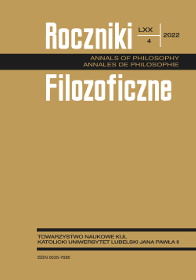Poza tolerancję? Spinozjańska koncepcja dotycząca preferencji i uzasadnień
Abstrakt
Termin „tolerancja”, ściśle mówiąc, nie należy do słownika Spinozy, podobnie jak pojęcie „tolerancji”. Jednak rozdział teologii i polityki, o której mowa w Traktacie teologiczno-politycznym, ukrywa jeszcze bardziej radykalny rozdział immanencji i transcendencji. Całkowicie immanentne ustawodawstwo byłoby neutralne w kwestii wszelkiego rodzaju „wartości” i „uzasadnień” (moralnych, religijnych, racjonalnych). Opierałoby się wyłącznie na „koncepcjach” indywidualnych „preferencji”. Argumentujemy, że filozofia Spinozy może nam pomóc wyobrazić sobie (a być może w przyszłości również osiągnąć) taką formę radykalnej, czy „absolutnej” demokracji.
Bibliografia
Bove, Laurent, Gérard Bras, and Eric Mechoulan, eds. Pascal et Spinoza:Pensées du contraste: de la géométrie du hasard à la nécessité de la liberté [Pascal and Spinoza: Thoughts of Contrast: From the Geometry of Chance to the Need for Freedom]. Paris: Éditions Amsterdam, 2007.
Chemin, Ariane, Thomas Wieder, and Vincent Martigny. L’Atelier du Pouvoir. France Culture, January 21, 2017. Podcast, https://www.radiofrance.fr/franceculture/podcasts/l-atelier-du-pouvoir?p=1.
Hardt, Michael, and Antonio Negri. Commonwealth. Cambridge, MA: Belknap Press of Harvard University Press, 2009.
Israel, Jonathan I. Radical Enlightenment: Philosophy and the Making of Modernity 1650-1750. Oxford: Oxford University Press, 2001.
Jaquet, Chantal, ed. La Générosité à l’œuvre: Hommage à Jean-Marie Beyssade [Generosity at Work: Homage to Jean-Marie Beyssade]. Paris: Classiques Garnier, 2019.
Laclau, Ernesto, and Chantal Mouffe. Hegemony and Socialist Strategy: Towards a Radical Democratic Politics. London–New York: Verso, 1985; 2001.
Laerke, Mogens. Spinoza and the Freedom of Philosophizing. Oxford: OUP, 2021.
Matheron, Alexandre. Individu et communauté chez Spinoza [Individual and community in Spinoza]. Paris: Minuit, 1969.
Matheron, Alexandre. Le Christ et le salut des ignorants chez Spinoza [Christ and the Salvation of the Ignorant in Spinoza]. Paris: Aubier-Montaigne, 1971.
Milner, Jean-Claude. Le Sage Trompeur: Libres raisonnements sur Spinoza et les Juifs. Court traité de lecture I [The Sage Deceiver: Free Reasoning on Spinoza and the Jews. Short Treatise on Reading I]. Lagrasse: Verdier, 2013.
Miqueu, Christophe. Spinoza, Locke et l’idée de citoyenneté: Une génération républicaine à l’aube des Lumières [Spinoza, Locke and the Idea of Citizenship: A Republican Generation at the Dawn of the Enlightenment]. Paris: Classiques Garnier, 2012.
Ramond, Charles. Qualité et Quantité dans la philosophie de Spinoza [Quality and Quantity in Spinoza]. Paris: Presses Universitaires de France, 1995.
Ramond, Charles. Spinoza Contemporain: Philosophie, Éthique, Politique [Contemporary Spinoza: Philosophy, Ethics, Politics]. Preface by Alain Séguy-Duclot. Paris: L’Harmattan, 2016.
Ramond, Charles. “Spinoza, a Democrat or a Republican?” In “Spinoza Today,” edited by Agon Hamza and Frank Ruda, Crisis and Critique 8, no. 1 (2021): 264–87.
Ramond, Charles. Sentiment d’injustice et chanson populaire [Sentiment of injustice and popular music]. Sampzon: Delatour France, 2017.
Rancière, Jacques. Disagreement: Politics and Philosophy [La Mésentente: politique et philosophie]. Translated by Julie Rose. Minneapolis: University of Minnesota Press, 1998.
Copyright (c) 2022 Roczniki Filozoficzne

Utwór dostępny jest na licencji Creative Commons Uznanie autorstwa – Użycie niekomercyjne – Bez utworów zależnych 4.0 Międzynarodowe.





